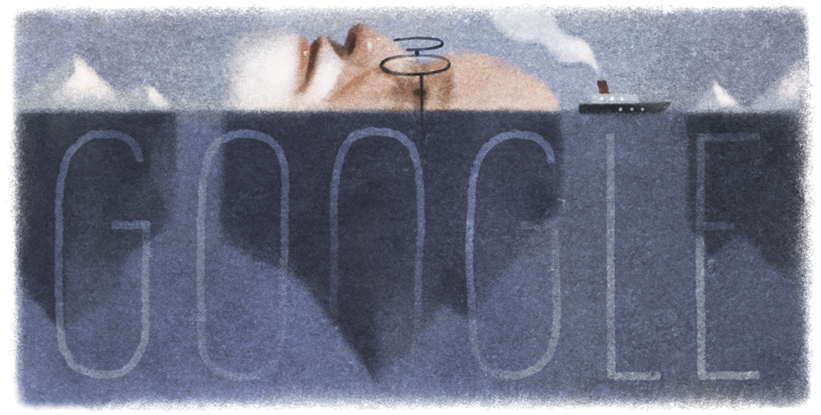Sigmund Freud has been honoured with a Google doodle to celebrate 160 years since his birth.

To mark the occasion, the Freud Museum London has teamed up with the Google Cultural Institute to present an online exhibition, Sigmund Freud: A Life in Psychoanalysis.
The exhibition showcases key items from the Museum’s collection in glorious high resolution, video clips from leading psychoanalysts and academics, and a rare audio recording of Freud’s voice.
‘I do not wish to arouse conviction; I wish to stimulate thought and to upset prejudices.’
Sigmund Freud
Sigismund Schlomo Freud was born in Freiberg, Moravia, on 6 May 1856, to a family of wool merchants. The family soon moved to Vienna, where Freud spent most of his life.
He is remembered today as the founder of psychoanalysis, a revolutionary theory of how the mind works and a method of treating people in mental distress.
Psychoanalysis holds that human behaviour is largely determined by unconscious motivations that stem from childhood experiences, specifically encounters with love, loss, sexuality and death, and complex emotional attitudes to parents and siblings.
Freud arrived at these conclusions through the method of free association, in which the patient is invited to recline on the couch and say whatever comes to mind, without holding back thoughts and memories that seem unpleasant, trivial or ridiculous.
The method of free association led Freud to propose the existence of a dynamic unconscious, containing ideas that have been pushed out of consciousness, only to return in disguised forms such as dreams, slips of the tongue, little mistakes, daydreams and thoughts that occur to us ‘out of the blue’.
He may have identified the workings of the unconscious in all sorts of trivial occurrences, but that does not mean that Freud saw the unconscious itself as trivial. He found it at work in the symptoms and anxieties that tormented his patients.
Sigmund Freud shaped the 20th century idea of what a person is; we would not recognise ourselves without him. Freud’s stories have become our stories, his map is our map.’Professor Marina Warner, novelist and cultural historian
The picture of human beings that emerged from Freud’s work is an unsettling one: psychoanalysis reveals a mind divided against itself, lacking self-knowledge and governed by unruly instinctual impulses.
‘I discovered some important new facts about the unconscious. […] I had to pay heavily for this bit of good luck.’
Sigmund Freud
The Google Doodle features Freud’s face as the tip of an iceberg, to which Freud’s account of the mind is often compared, although Freud himself never used the metaphor. The Doodle also features an ocean liner, in a possible allusion to Freud’s journey to the USA in 1909.
Freud was one of the most influential and controversial thinkers of the 20th Century. His findings about the unconscious, sexuality and childhood aroused immense hostility, but today psychoanalysis is practiced by thousands of clinicians around the world, and Freud’s ideas continue affect how we understand ourselves.
‘To us he is no more a person
Now but a whole climate of opinion
Under whom we conduct our different lives.’
W. H. Auden, from the poem ‘In Memory of Sigmund Freud’.
This year is also the 30th anniversary of the Freud Museum London, the house in which Freud spent the last year of his life as a refugee from Nazi persecution. It contains his study, preserved since he lived there, including his library, his remarkable collection of antiquities and his iconic couch.
To coincide with Freud’s 160th birthday, the Museum is launching a major fundraising appeal.
Since its opening in 1986, the Museum has established an international reputation as one of London’s best historic house museums. It engages audiences of all ages and backgrounds with the legacies of Sigmund and Anna Freud through an innovative public programme and education service, and promotes causes in mental health and wellbeing.
An independent charity, the Museum receives no public or government funding. It relies on the generosity of friends and supporters who are passionate about the Museum and its work.
‘At the Freud Museum we are proud of all that we achieve, but we do need help both with running costs and with development. Many visitors tell us this is a favourite place – we hope that they will help to keep it special by making an anniversary gift to the Museum.’
Carol Seigel, Director of the Freud Museum London
To continue in our work, we need your help. Please consider making a donation to help secure the future of the Museum.



